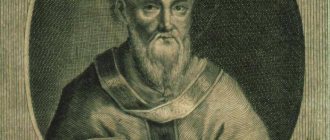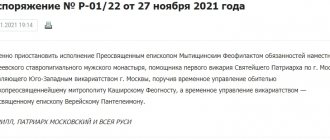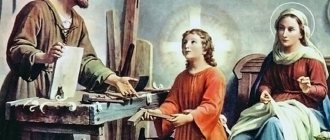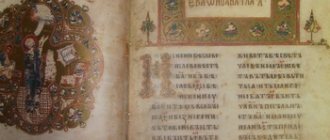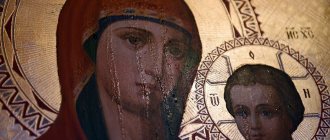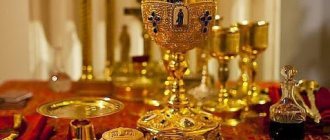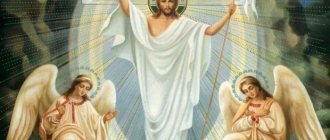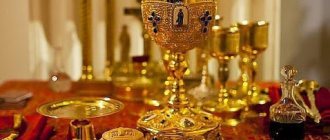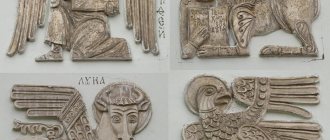| Theophylact of Bulgaria |
Theophylact (Ifestus), Bulgarian
(+ c. 1126), Archbishop of Ohrid, blessed, venerable [1], Byzantine theologian and writer Commemorated December 31 (Serb., Greek, OCA, ROCOR) and in the Council of Euboean Saints (Greek)
Born between 1050 and 1060 [2] in the city of Chalkis on the island of Euboea. The training took place in Constantinople.
Having completed his education, Theophylact remained in the capital, where he was ordained a deacon, was a member of the clergy of the Church of Hagia Sophia and bore the title of rhetorician of the Great Church. His duty was to explain the Holy Scriptures and write instructive words on behalf of the patriarch. In one ancient monument, Blessed Theophylact is called a teacher of rhetoricians. This was the name given to those rhetoricians who were especially distinguished by the gift of preaching and therefore could serve as an example for other less capable and experienced preachers.
For several years he worked in a school at the Patriarchate, but it was not a religious educational institution, and many of his students became teachers, doctors, military officers, officials, judges, as well as priests. Notable among them was Constantine Ducas, the presumptive heir to the Byzantine throne. The son of the former Emperor Michael VII and the Caucasian princess Maria of Alania was entrusted to the care of Theophylact, probably in 1085 or 1086, by Emperor Alexius I Komnenos [3]. In 1087, the wife of Emperor Alexei gave birth to a son, John, who became the heir to the throne.
Maria Alanskaya maintained close friendly relations with Theophylact and provided him with her patronage. It was at the request of Basilissa (Empress) Mary that he wrote a lengthy and significant commentary on the Gospels; Theophylact worked on it probably while he lived in Ohrid. The removal of Theophylact from the capital, where he rushed in vain, is probably due to the disgrace of the imperial family. Mikhail.
The exact time of Theophylact's accession to the archbishop's see of Bulgaria has not been determined with precision and is causing much debate. Some sources claim that it happened before 1081 [4], others believe that in 1089 or 1090 [2].
Basil II annexed Bulgaria to the Byzantine Empire in 1018, allowing them to retain some of their most cherished national institutions, chief among them their Church. In three charters issued between 1019 and 1025, the emperor claimed that the Archbishopric of Ohrid (replacing the Bulgarian Patriarchate since independence) was autocephalous. Only from half a century on did Bulgarian archbishops begin to be sent from Constantinople and appointed not from natural Bulgarians, but from Greeks.
Blessed Theophylact took the archbishop's see after John Ainos.
As soon as Theophylact entered the city, he, he wrote to his friend, was “ overtaken by a murderous stench
" Even worse, the residents of Ohrid greeted their new archbishop with ridicule and insults and sang a “victory song” in the streets, deliberately glorifying the past glory of independent Bulgaria, obviously in order to offend him.
It is quite understandable that because of such a hostile meeting, Theophylact’s thoughts turned to the imperial capital he had recently left, and in the same letter - one of the first he wrote in Macedonia - he succumbed to a strong attack of homesickness. “ I barely managed to set foot on the land of Ohrid, but I’m already yearning for the city, which, like a reckless lover, does not let us go from its embrace
».
In addition to the brutal simplicity of the Bulgarians, he encountered many things here that should have greatly crushed any zealous archpastor. The Bulgarian Church suffered from a large number of heretics. The Paulicians, and then the Bogomils, everywhere sowed confusion among the people and, reinforced by their numbers, openly attacked the defenders of Orthodoxy. In external terms, it suffered a lot from the secular rulers of Bulgaria and, moreover, was subjected to frequent devastation from external enemies. Moreover, the Bulgarians themselves constantly grumbled about their political humiliation.
Life among the Bulgarians seemed like imprisonment to him, and he even asked to be spared from this difficult fate. He wrote about his situation in Bulgaria to the Empress Maria and the Great Domestic. More than a hundred of his letters to the highest clergy and secular officials of the empire have survived. These letters are full of complaints about fate; the sophisticated Byzantine treated his Slavic flock with disgust, the barbarians who “smelled of sheepskin.” But little by little he got used to his position in Bulgaria, fell in love with the Bulgarians for their simple but sincere piety and, despite any opposition, devoted himself with fatherly care to the structure of his church. Obstacles from enemies, apparently, only intensified his zeal for the good.
In the administration of the Bulgarian Church, Blessed Theophylact showed himself to be an archpastor as wise in his plans as he was firm in fulfilling them. Understanding well that for the spiritual enlightenment of the people he most needed capable helpers, he paid the strictest attention to the election of worthy shepherds, especially bishops.
| Theophylact, Archbishop of Bulgaria |
Thus, one day the Duke of Skopia asked him to make one person bishop, and Blessed Theophylact answered him with dignity and strength: “ Neither you, my lord, should interfere in this great work, which must be done with fear, nor should I so frivolously decide to inform Divine grace
."
The ruler promised to thank the saint for the fulfillment of his request, but blessed Theophylact responded to this: “ My lord!
If the one for whom you are interceding is the same (like the other chosen ones), then it is not you who should thank me, but I who should thank you. If he is unknown to either our church or has not earned special approval in Constantinople for his piety and enlightenment, then do not offend God and do not order us, for we are commanded to obey God more than man [5] .”
In order to see more closely the needs of each church, Blessed Theophylact convened bishops at councils and here considered all problems. Here he subjected to general discussion those matters for which mutual consultation was necessary. Local councils, according to church rules, must meet at certain, specific times, and Blessed Theophylact was so faithful to these sacred rules that no obstacles could keep him from fulfilling them. “ I have not yet freed myself from a serious illness,
- he wrote one day, getting ready for a council, -
how the sacred voice of church rules prompted me to convene a sacred council.
The voice of Christ truly awakens from the bed, gives strength to free movement and travel, and commands to carry the very bed .”
Blessed Theophylact did a lot to protect the property of the church, which was plundered by the secular rulers of Bulgaria, the collectors of royal taxes. During the internal and external decline of the Byzantine Empire, the Greek Church often bore the burden of state taxes along with the people. But the Bulgarian Church had to bear the burden of double taxes - for the benefit of the state and to satisfy the greed of the collectors themselves. Being far from the capital, these officials, without any fear, plundered church property under the pretext of legal collection. Blessed Theophylact often received written reports about this from bishops who were unable to defend their churches themselves. He saw the same thing in his diocese. But his opposition to the illegal actions of the collectors turned them against him. Having been enemies of the church until now, they now became his personal enemies. In addition, some of them seemed to have other, more compelling reasons to hate him and attack the Church of God.
Enemies spread rumors about the saint in Constantinople that he was illegally enriching himself at the expense of the poor Bulgarians; they reported this to the emperor himself, assuring him that the Bulgarian archbishop was too strong and enjoyed power that exceeded his rank. In Bulgaria itself they armed a church minister named Lazar against him. This Lazarus walked around Bulgaria and incited against the archbishop all those excommunicated from the Church for heresies or for any crimes against the rules of the Church.
Despite all the sorrows that Blessed Theophylact encountered while defending the rights and property of the Bulgarian Church, he did not reduce his zeal for its good. He wanted to be a father for his flock and did for them not only what he was obliged to do by his title, but also what his Christian love prompted him to do. His fatherly concern for the good of the Bulgarian Church was especially evident in cases of enemy attacks to which Bulgaria was subjected from neighboring peoples. The barbarians, devastating the country, robbed and burned churches, plundered church property, which forced the clergy to hide in forests and deserts. Blessed Theophylact, paternally worried about the fate of the Bulgarian Church, used all means to alleviate its disasters; when he couldn’t find them, he asked others for help. During the attack on Bulgaria by the Apulians under the leadership of Bohemond in 1107, Blessed Theophylact himself had to flee from Ohrid to Thessaloniki.
Concerns for the good of the Bulgarian Church often prompted Blessed Theophylact to travel to Constantinople to personally intercede there on her behalf. In many letters he talks about these trips to the capital [6]. The patronage of the pious Empress Maria did not stop for him when he retired to Bulgaria, and he did not cease to have respect for his patroness not only when she sat on the imperial throne, but also after, when she lived in solitude in the company of ascetics. He also had many other friends and patrons. Therefore, it was always comforting for him to be in Constantinople in their company. Some of them helped him very significantly in caring for the good of the Bulgarian Church - they either interceded on his affairs before the emperor, or helped poor Bulgarian churches and monasteries with their property.
It is unknown how long Theophylact's service as Archbishop of Ohrid lasted. Drawing dates from letters, it can be argued that it ended no earlier than 1108. If the dating of the manuscript of one of his poems is reliable, then in 1125 he was still alive, but whether he was still Archbishop of Ohrid is unknown.
According to Serbian sources, at the end of his life he moved to Solun, where he died [7].
| Blazh. Theophylact of Bulgaria, Archbishop. Ohrid |
Blessed Theophylact, Archbishop of Bulgaria and his works
Blessed Theophylact was from the city of Chalkis in Greece. The year of his birth is not known with certainty; one can only say that he was born approximately in the first half of the eleventh century.
He spent the first half of his life, and most of it, in Constantinople. Here he received an excellent education and here he began his service for the benefit of the Church with the rank of deacon of the Great Church. Despite their small rank, this title was very important at that time, since these deacons were the patriarch’s close assistants in almost all matters of his ministry.
Theophylact's duties were to explain the Holy Scriptures and deliver teachings. In this matter, he showed remarkable oratorical talent and great knowledge not only in patristic literature, but also in secular literature, so that his contemporaries considered him an exemplary preacher and in this sense called him “the teacher of rhetoricians.”
He remained in the rank of deacon of the Great Church for quite a long time, since the Patriarch of Constantinople did not want to let him go for a long time, as an outstanding, gifted employee, and only at a rather advanced age, approximately in 1081, he was appointed to Bulgaria, in church terms dependent on Constantinople, - the first hierarch of this country, the Archbishop of Ohrid.
His activities in the rank of archbishop proceeded in very difficult conditions, since the flock was dark and rude and, in addition, there were a lot of heretics in Bulgaria. The Paulicians, Bogomils and other heretics, due to their large numbers, greatly dispelled their errors among the people and armed the people against Orthodoxy and the archbishop. Realizing that such evil can only be fought through enlightenment and the appointment of worthy shepherds, Blessed Theophylact, on the one hand, zealously taught the people, orally and in writing, expounding on the basis of the patristic works the true meaning of the New Testament Scriptures and sending out numerous messages - as a result, many remained after him messages to various persons, brief discussions about heretics and various interpretive works - on the other hand, when choosing pastors, he was guided either by the piety of the candidates, the severity of their life, or by their learning and eloquence. In this case, no outside motives, no kinship, no friendship, no requests, no pressure from secular power could force him to choose an unworthy or unknown person. Thus, one day the duke (prince) of Skopia asked him to make an unknown person a bishop, and blessed Theophylact answered him with dignity and strength:
“Neither you, my lord, should interfere in this great work, which must be done with fear, nor should I frivolously decide to communicate Divine grace.
The ruler promised to thank the saint for the fulfillment of his request, but blessed Theophylact answered this too:
- My lord! If the one for whom you are interceding is the same (i.e., like the other chosen ones), then it is not you who should thank me, but I who should thank you. If he is unknown neither in our Church nor in Constantinople has earned special approval for his piety and enlightenment, then do not insult God and do not order us; for we are commanded to “obey God rather than man” (Acts 5:29).
Carrying out strict and attentive supervision over all the shepherds, Blessed Theophylact avoided drastic measures, but always tried to influence with gentle suggestion and persuasion. An example of this is his behavior during clashes with a Triadic bishop who was unjustly persecuting an elderly monk. Blessed Theophylact all the time tried to influence the bishop with exhortations and messages, but he not only did not listen to him, but even, having become an enemy, went to Constantinople and tried to slander his archbishop there. And so, despite all these actions of the rebellious bishop, Blessed Theophylact subsequently treated him with love and forgiveness when he turned to him with a request to forgive him. “Just pray for me,” wrote Blessed Theophylact to the bishop, “and bless, and do not curse, the one who loves you.”
Finally, he had to fight against propaganda. A monument to this struggle remains his “Discourse on what the Latins are accused of.” In it, Blessed Theophylact avoids quarreling about minor differences and customs, for, as he says, not every difference in customs should lead to division, but only that which concerns dogmas.
Although he calls all Latin disagreements, in addition to dogmas, unjust, he considers it possible to cover them with Christian love.
He is mainly armed against the addition of “and from the Son” to the Creed.
“Here,” writes Blessed Theophylact, “is the most dangerous evil, and if they do not allow corrections to be made, then there is no need to give in, even if they spoke from the throne, which those who ascend so boast, even if they put forward the confession of Peter, even if they promised bliss, even if showed us the keys of the Kingdom of Heaven... However, in this regard, there is no need to argue about words, but look at the deed; we must pay attention to whether anything here depends on the poverty of the language; moreover, in conversations there may be expressions that are not precise; only complete certainty must be demanded from the confession of faith. Let us not argue too much with the rebellious minds of these people, neither about unleavened bread, nor about fasting, nor about anything else. We must endure evil in order to prevent greater things; we must allow what cannot be changed, so as not to destroy the communion of love. Following the example of the apostles, one must appear weak to the weak and follow the example of the Savior, who laid down His soul in order to gather the scattered children into a single herd.”
Although Blessed Theophylact was a Greek by birth and upbringing, he was a true father for the Bulgarian Church. Despite the sorrows that he had to experience during his archbishopric, he stood with unflagging zeal for her independence, for her property and all her interests, if they were threatened with damage from any quarter. And this had to be met from all sides. Firstly, with the internal and external decline of the Byzantine Empire, which controlled the Bulgarian kingdom, the Bulgarian Church had to bear the burden of double taxes - in favor of the state and to satisfy the greed of the collectors themselves. Being far from the capital, these officials, without any fear, plundered church property under the pretext of legal collection. Secondly, the Bulgarian Church in his time suffered a lot from hostile attacks from neighboring peoples. The barbarians, devastating the country, robbed and burned churches, plundered church property and forced the clergy to hide in forests and deserts.
During the attack on the Bulgarian kingdom of the Allurians, blessed Theophylact himself had to flee from Ohrid to Thessaloniki. The zealous archpastor, paternally sympathizing with the sorrows of the Bulgarian Church, used all the means in his hands to alleviate its disasters, and when he did not find them at home, then he turned to others for help. Very often these concerns prompted him to travel even to Constantinople to personally intercede on her behalf, and these trips always brought good results. His Constantinople friends either interceded on his affairs with the emperor, or helped the poor Bulgarian churches with their property.
Despite all the disasters that the Bulgarian Church had to experience, Blessed Theophylact never agreed to sacrifice its independence and place it under the protection of the Patriarch of Constantinople, just as even some patriarchs did. Although this would have guaranteed both himself and the Bulgarian Church great peace, he still did not want to give up its eternal rights for the sake of temporary benefits.
In order to better see the needs of the Bulgarian Church, Blessed Theophylact gathered bishops to councils and here considered everything that required correction and improvement. Here he also subjected to a general discussion what was needed for mutual consultation.
He considered convening these councils such an important duty that even illness could not keep him from fulfilling it. “I had not yet freed myself from a serious illness,” he wrote one day while preparing for a council, “when the sacred voice of church rules prompted me to convene a sacred council. The voice of Christ truly awakens from the bed, gives strength to free movement and travel, and commands the bed itself to be carried.”
Despite the fact that Blessed Theophylact was a worthy shepherd, he still had many personal enemies. Lawless collectors, heretics, disgraced shepherds - they all tried to slander him not only in Bulgaria among the people, but also in Constantinople before the emperor and patriarch.
However, as one might expect, these slanderers did not have much success anywhere. In Bulgaria, the people, although dark, but simple-hearted and sincerely religious, soon highly appreciated their worthy archpastor and therefore did not easily succumb to the slanderous suggestions of his enemies, and in Constantinople lived many of his friends, among whom was the pious Empress Maria herself, and who were good to him. they knew from his previous activities in Constantinople, they knew his truly Christian virtues and therefore always supported him in the difficult circumstances of his life.
In general, it must be said that Blessed Theophylact spent a lot of work and energy in governing the Bulgarian Church, he had to experience a lot of sorrows and troubles, but nothing defeated his apostolic zeal, which he maintained until the end of his arduous life. He died around 1107, having served as a Bulgarian bishop for about thirty years. In his letters dating back to this year, Blessed Theophylact often spoke about his ailments and illnesses, which hindered his archpastoral activities and confined him to his bed. Since among the known letters belonging to this saint, not a single one has reached us that could be attributed with full confidence to a later time than 1107, there is reason to believe that it was at this time that he died.
Blessed Theophylact is one of the most respected teachers of the Church. His works were always revered by church writers on a par with the works of other holy fathers and teachers of the Church, and some even called him a saint. This name is found in some ancient lists of his creations, as well as in early printed editions of the Blagovestnik in the Slavic language. Blessed Theophylact is also named in the “Church History” of the famous Greek writer Meletius of Athens, and our Saint Demetrius of Rostov speaks of him in his sermon “The Most Precious Pearl” as “Saint Theophylact, Archbishop of Bulgaria”, and in another place calls him “the interpreter Evangelical, Saint Theophylact." In general, Blessed Theophylact always enjoyed great respect as the father and teacher of the Church. He fully deserved this attitude towards himself, since his entire life and activities for the benefit of the Church, as we have seen, were distinguished by true apostolic zeal, and his works, written under the great influence of patristic literature, fully reflect its holy and deep character.
From the works of Blessed Theophylact, in addition to the mentioned “Discourse” against the Latins and several brief arguments against heretics, more than one hundred and thirty letters are known, several words (on the week of the veneration of the cross, on the day of the Entry into the Temple of the Blessed Virgin Mary, a word of praise to Emperor Alexei Komnenos, a word on the martyrdom of the Tiberiupol martyrs), an essay on the royal education and, finally, its interpretation:
1) for the five minor prophets - Hosea, Habakkuk, Jonah, Nahum and Micah,
2) four evangelists (“Blagovestnik”),
3) on the Acts of the Apostles,
4) on the Council Epistles,
5) on the epistles of the Apostle Paul.
The Interpretations are the most extensive and valuable work of Blessed Theophylact. He could acquire the skill to explain the Holy Scriptures even at the time when he settled in Constantinople and, with the rank of rhetorician of the Great Church, or Hagia Sophia, began to interpret the Bible for edifying purposes before the people.
Although Blessed Theophylact is not completely independent in his interpretations, being well acquainted with the patristic works and loving them, he skillfully collected from them and combined everything that was best and most essential for the understanding and interpretation of Holy Scripture.
This quality constitutes the main advantage of his interpretations, and therefore they greatly facilitate the work for anyone who would like to study the New Testament Scriptures according to the works of the holy fathers, who would like to be imbued with the truly patristic spirit of understanding the New Testament or to become acquainted with the patristic attitude towards it.
Of all the Church Fathers, the greatest influence on him was St. John Chrysostom. This was his favorite interpreter of the Holy Scriptures. He gives his interpretations in his works either literally, or by shortening them a little and inserting only partly his own expressions and some thoughts.
Of the entire interpretative works of Blessed Theophylact, the greatest is his “Good News”, or interpretation of the four Gospels. And everything that we have said about the nature of his works must be said in particular about the “Blagovestnik”. Therefore, this work can be especially recommended to anyone who is dear and interested in becoming acquainted with the true patristic interpretation of the Holy Scriptures.
Reverence
Blessed Theophylact enjoyed from ancient times the glory of a holy father and teacher of the Church. This is how some ancient lists of his works and early printed Slavic editions of his Blagovestnik are inscribed. And Greek writers sometimes call him a saint and refer to his works as the works of a saint, whose thoughts should be respected as the thoughts of a father and teacher of the Church. No later than the beginning of the century, his memory began to be placed in the Serbian synaxarions under December 31 - so in the “Ohrid Prologue” of St. Nicholas (Velimirovich); in the Serbian Lives of Saints, compiled by the Monk Justin (Popovich). Subsequently, it began to be celebrated both in the Greek environment [8], and in the Orthodox Church in America [9], and in the Russian Orthodox Church Outside of Russia [10].
Preface by the author
Those divine men who lived before the law did not learn on the basis of scriptures and books, but, having a pure mind, were enlightened by the illumination of the All-Holy Spirit, and thus recognized the commandments of God, for God Himself spoke with them mouth to mouth. Such were Noah, Abraham, Isaac, Jacob, Job and Moses. When people became vicious and unworthy of being enlightened and taught by the Holy Spirit, the humane God gave the scriptures so that, at least thanks to them, they would remember the commandments of God. So Christ Himself personally spoke with the apostles and sent them the grace of the Holy Spirit as a teacher. But since heresies were to grow after that and our morals were to deteriorate, the Lord wanted the Gospels to be written so that we, having learned from their truths, would not be carried away by the lies of heresies, and so that our morals would not deteriorate completely.
The Lord gave us the four Gospels, perhaps because on the basis of them we learn the four main virtues - courage, wisdom, justice and chastity: courage, when the Lord says: “Do not be afraid of those who kill the body but are not able to kill the soul” (Matthew 10, 18); wisdom, as he says: Be wise like a serpent (Matthew 10:16); justice when he teaches: “And whatever you want people to do to you, do so to them” (Luke 6:31); chastity, when he says: “Whoever looks at a woman lustfully has already committed adultery with her in his heart” (Matthew 5:28). Moreover, the four Gospels exist because they are the pillars of the world. But just as the world has four sides - east, west, north and south - there had to be four pillars. Then the four Gospels also exist because they contain subjects of four kinds, namely: dogmas and commandments, threats and promises. Those who believe in the dogmas and keep the commandments are promised future benefits. Those who do not believe in the dogmas and do not keep the commandments are threatened with future punishment. The Gospel received its name because it tells us about good and joyful things for us, that is, good things, such as: remission of sins, justification, ascension to heaven, adoption by God. It also proclaims that we receive these benefits easily, because we did not work to acquire them and did not receive them for our good deeds, but by the grace and love of God we were rewarded with such great benefits.
There are four evangelists. Of these, two - Matthew and John - were from among the twelve, and the other two - I mean Mark and Luke - were from the seventy. Mark was Peter's companion and disciple, and Luke was Paul's. Matthew was the first of all to write eight years after the Ascension of Christ the Gospel in Hebrew for the Jewish believers. John is said to have translated it from Hebrew into Greek. Mark, taught by Peter, wrote the Gospel ten years after the Ascension, Luke - after fifteen, and John the Theologian - thirty-two years later. For they say that after the death of the three evangelists, three Gospels were brought to him at his request in order to examine them and discuss whether they were written correctly. John, having looked through them and received the abundant grace of truth, himself completed what they omitted, and expanded what they said briefly in his Gospel. Therefore, he began with the doctrine of God the Word. For while others did not mention the eternal existence of God the Word, he theologized about this, so that they would not think that the Word of God is simply a man, that is, alien to the Divine. Matthew speaks only of the life of Christ in the flesh, because he wrote for the Jews, for whom it was enough to know that Christ was born of Abraham and David. For the Jewish believer calms down as soon as he is convinced that Christ came from David.
But you say to me, “Wasn’t one evangelist enough?” So listen: one was enough, but in order for the truth to stand out more clearly, for this purpose four received permission to write them. And when you see that these four, although they did not meet and did not sit in one place, but were each apart, and yet wrote about the same thing as if with the same lips, then don’t you marvel at the truth of the Gospel and say, what the evangelists said by the Holy Spirit!
Don't tell me they don't agree on everything, look at what they disagree on. Did one of them say that Christ was born and the other that he was not, or did one say that Christ was resurrected and the other not? It won't happen! They agree on what is more necessary and more important. So, if they do not disagree on the most important things, then why are you surprised if they seem to disagree on the unimportant? Their truth is reflected most of all in the fact that they do not agree on everything. Otherwise they would have been thought to have written while seeing each other and consulting. Now what one omitted was written by another, which is why it seems that they sometimes contradict. And so it is. Let us begin the interpretation.
After training, Theophylact was elevated to the rank of deacon
After he completed his studies, he remained in the capital. Here he was elevated to the rank of deacon. Then he was sent to serve in the Church of Hagia Sophia. It was during that period of time that Theophylact bore the title of rhetorician of the Great Church. For some time he was a minister in a school at the patriarchal department. One of his duties was teaching. He taught rhetoric and also gave interpretations of the Holy Scriptures. At this time, he also composes teachings for believers.
His talents and devotion to the ideals of the Christian faith, as well as his zeal, made him quite famous at the court of the emperor. The son of Michael the Seventh and Maria of Alansk, Tsarevich Constantine Dukas, became Theophylact’s pupil. At the request of Empress Maria, Theophylact composed several theological works. The Empress bestowed her patronage on Theophylact of Bulgaria.
Empress Maria of Alania - whose son was a pupil of Theophylact of Bulgaria.
It was also at her request that Theophylact compiled several theological works. Photo: www.treef.ru
